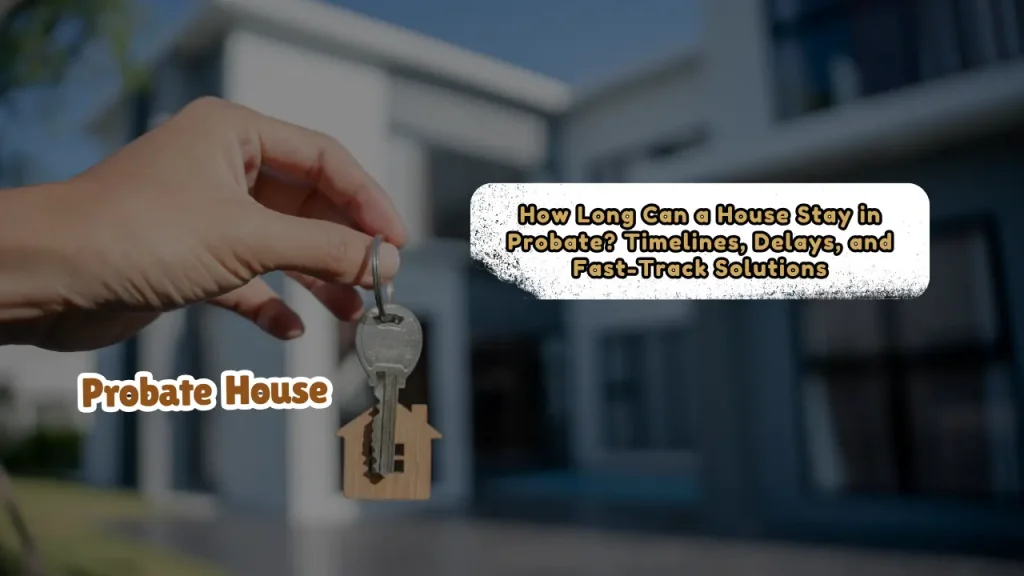How Long Can a House Stay in Probate? Timelines, Delays, and Fast-Track Solutions
A house can stay in probate for several months to a few years, depending on factors like the complexity of the estate, state laws, disputes among heirs, and whether the property is sold during the process. On average, probate takes 6 months to 2 years, but contested cases or large estates can drag on for 3–5+ years.
Table of Contents
Understanding Probate and Its Impact on a House
Probate is the court-supervised process of settling a deceased person’s debts, taxes, and assets, including real estate. Until probate closes, the house remains in legal limbo—you can’t legally sell, rent, or transfer ownership without court approval.
Key Impacts on Inherited Homes:
- Ownership Freeze: The house is legally frozen until debts are paid and heirs are confirmed.
- Financial Strain: Mortgage payments, property taxes, and maintenance costs drain the estate.
- Depreciation Risk: Vacant homes lose 2–5% of value monthly (National Association of Realtors).
7 Factors That Dictate Probate Timelines
- State Laws:
- Fast-track states (e.g., Texas) allow “independent administration,” wrapping up in 6–9 months.
- Slow-track states (e.g., California) require court hearings for most steps, averaging 9–18 months.
- Estate Complexity:
- Simple Estates (one home, no debt): 6–12 months.
- Complex Estates (multiple properties, IRS audits): 12–24+ months.
- Presence of a Will:
- A valid will acts as a roadmap, cutting probate time by 3–6 months.
- No will (intestate)? Courts decide heirs, adding delays.
- Family & Creditor Disputes:
- Heir conflicts (e.g., sibling rivalries) cause 29% of probate delays.
- Creditors have 2–12 months to file claims, depending on the state.
- Debts & Taxes:
- Unpaid property taxes or liens stall the process.
- IRS penalties hit 25% of owed amounts if deadlines are missed.
- Court Backlogs:
- Busy urban courts (e.g., Los Angeles, NYC) add 6–12 months to timelines.
- Selling the House:
- Market conditions and buyer issues (e.g., lowball offers) can prolong probate.
Related article for you:
Can You Rent a House in Probate? 2025 Tenant & Executor Playbook

Typical Probate Timelines
| Scenario | Timeline | Example States |
| Simplified Probate | 3–6 months | Ohio (estates <$50k) |
| Standard Probate | 6–24 months | Florida, New York |
| Complex/Contested | 2–5+ years | California, Illinois |
Ways to Expedite Probate for a House
- Leverage Small Estate Shortcuts:
- Use a Small Estate Affidavit for estates under:
- $184,500 in California (Probate Code §13100).
- $75k in Florida (Fla. Stat. §735.201).
- Use a Small Estate Affidavit for estates under:
- Sell the House Early:
- In Texas, executors can sell pre-probate via “power of sale” clauses.
- Use rental income to offset costs while waiting for probate.
- Bypass Probate Entirely:
- Living Trusts: Transfer the house into a trust—assets pass in 2–4 weeks.
- Joint Ownership: Add a co-owner with “right of survivorship” (automatic transfer).
- Transfer-on-Death Deeds: Valid in 29 states (not CA or NY).
- Hire a Probate Attorney:
- Estates with lawyers close 30% faster (Martindale-Nolo).
Related article: Legally Sell A Deceased Person’s Car Without Probate
How Probate Works in Different States
| State | Key Probate Features | Avg. Timeline |
| California | Court-heavy process; small estate options | 9–18 months |
| Texas | Independent administration | 6–9 months |
| Florida | Summary Administration for small estates | 6–12 months |
| New York | “Waiver of Process” with heir consent | 7–12 months |
Hot Tip: Check your state’s probate code (e.g., California Courts) for local quirks.
Can a House Be Occupied or Rented During Probate?
Yes, but with caveats:
- Executor Approval: The executor must manage the property and often needs court consent.
- Rental Income: Use funds to cover mortgage payments or upkeep (reported on IRS Form 1041).
- Tenant Risks: Leases may end early if the house sells—include an “estate sale clause” in agreements.
Example: A Dallas executor rented a probate home for $2,800/month, covering 80% of carrying costs.
How to Avoid Probate Delays
- Organize Documents Early: Inventory deeds, wills, and financial records.
- Pre-Negotiate with Heirs: Draft a “No-Contest Agreement” to prevent disputes.
- File Immediately: Submit death certificates and petitions within 30 days.
Final Thoughts
A house can linger in probate for months to years, but strategic planning cuts delays. Use tools like living trusts, small estate affidavits, or TOD deeds to bypass court gridlock. In 2025’s volatile market, time saved is equity preserved.
Stuck in probate? Use our free Probate Timeline Estimator to reclaim your inheritance.
Critical Resources
- State Probate Forms: Texas Law | Florida Courts
About the Author

Sarah Klein, JD, is an experienced estate planning attorney who has helped clients with wills, trusts, powers of attorney, and probate matters. At All About Lawyer, she simplifies complex estate laws so families can protect their assets, plan ahead, and avoid legal headaches during life’s most sensitive moments.
Read more about Sarah
